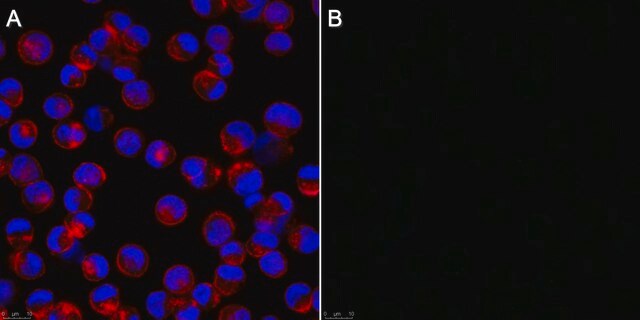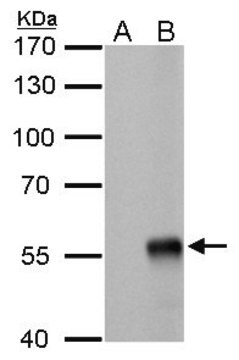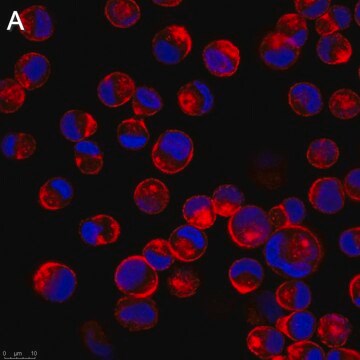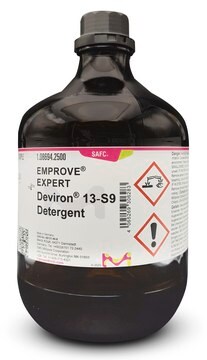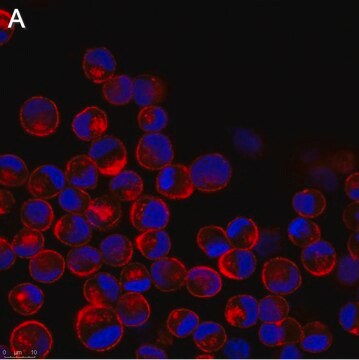MAB8257B
Anti-Influenza A Antibody, nucleoprotein, clone A1, biotin-conjugated
clone A1, Chemicon®, from mouse
Zaloguj sięWyświetlanie cen organizacyjnych i kontraktowych
About This Item
Kod UNSPSC:
12352203
eCl@ss:
32160702
NACRES:
NA.41
Polecane produkty
pochodzenie biologiczne
mouse
Poziom jakości
białko sprzężone
biotin conjugate
forma przeciwciała
purified immunoglobulin
rodzaj przeciwciała
primary antibodies
klon
A1, monoclonal
reaktywność gatunkowa
human
producent / nazwa handlowa
Chemicon®
metody
immunofluorescence: suitable
izotyp
IgG2a
Warunki transportu
wet ice
Specyficzność
Specific for the Influenza A nucleoprotein. Has stronger binding with N1-type Flu A. Has been shown to react with the H5N1 strain. No cross reactivity seen to influenza B or other respiratory viruses.
Immunogen
Epitope: nucleoprotein
Influenza A
Zastosowanie
Detect Influenza A using this Anti-Influenza A Antibody, nucleoprotein, clone A1, biotin-conjugated validated for use in IF.
Immunofluorescence
Optimal dilutions must be determined by end user.
Optimal dilutions must be determined by end user.
Research Category
Infectious Diseases
Infectious Diseases
Research Sub Category
Infectious Diseases - Viral
Infectious Diseases - Viral
Postać fizyczna
Biotin conjugated purified immunoglobulin. Liquid in 0.01M PBS, pH=7.1, 0.1% Sodium Azide with 15 mg/mL BSA as stabilizer.
Przechowywanie i stabilność
Maintain at 2 to 8°C for up to 12 months from date of receipt. Protect from Light.
Inne uwagi
Concentration: Please refer to the Certificate of Analysis for the lot-specific concentration.
Informacje prawne
CHEMICON is a registered trademark of Merck KGaA, Darmstadt, Germany
Oświadczenie o zrzeczeniu się odpowiedzialności
Unless otherwise stated in our catalog or other company documentation accompanying the product(s), our products are intended for research use only and are not to be used for any other purpose, which includes but is not limited to, unauthorized commercial uses, in vitro diagnostic uses, ex vivo or in vivo therapeutic uses or any type of consumption or application to humans or animals.
This page may contain text that has been machine translated.
Nie możesz znaleźć właściwego produktu?
Wypróbuj nasz Narzędzie selektora produktów.
Kod klasy składowania
12 - Non Combustible Liquids
Klasa zagrożenia wodnego (WGK)
WGK 2
Temperatura zapłonu (°F)
Not applicable
Temperatura zapłonu (°C)
Not applicable
Certyfikaty analizy (CoA)
Poszukaj Certyfikaty analizy (CoA), wpisując numer partii/serii produktów. Numery serii i partii można znaleźć na etykiecie produktu po słowach „seria” lub „partia”.
Masz już ten produkt?
Dokumenty związane z niedawno zakupionymi produktami zostały zamieszczone w Bibliotece dokumentów.
Delivery of subunit influenza vaccine to skin with microneedles improves immunogenicity and long-lived protection.
Koutsonanos, DG; Vassilieva, EV; Stavropoulou, A; Zarnitsyn, VG; Esser, ES; Taherbhai et al.
Scientific Reports null
Mehfuz Zaman et al.
Clinical & translational immunology, 10(9), e1337-e1337 (2021-09-17)
The upper respiratory tract is the major entry site for Streptococcus pyogenes and influenza virus. Vaccine strategies that activate mucosal immunity could significantly reduce morbidity and mortality because of these pathogens. The severity of influenza is significantly greater if a
Roozbeh Abedini-Nassab et al.
Micromachines, 12(7) (2021-07-03)
Magnetic nanoparticles have attracted significant attention in various disciplines, including engineering and medicine. Microfluidic chips and lab-on-a-chip devices, with precise control over small volumes of fluids and tiny particles, are appropriate tools for the synthesis, manipulation, and evaluation of nanoparticles.
Sarah F Andrews et al.
Science immunology, 2(13) (2017-08-08)
Antigenic drift and shift of influenza strains underscore the need for broadly protective influenza vaccines. One strategy is to design immunogens that elicit B cell responses against conserved epitopes on the hemagglutinin (HA) stem. To better understand the elicitation of
Venkatramana D Krishna et al.
Frontiers in microbiology, 7, 400-400 (2016-04-12)
We have developed a simple and sensitive method for the detection of influenza A virus based on giant magnetoresistance (GMR) biosensor. This assay employs monoclonal antibodies to viral nucleoprotein (NP) in combination with magnetic nanoparticles (MNPs). Presence of influenza virus
Nasz zespół naukowców ma doświadczenie we wszystkich obszarach badań, w tym w naukach przyrodniczych, materiałoznawstwie, syntezie chemicznej, chromatografii, analityce i wielu innych dziedzinach.
Skontaktuj się z zespołem ds. pomocy technicznej